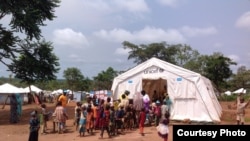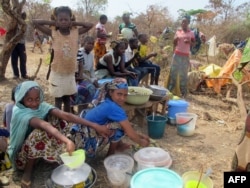U.N. aid agencies are struggling to meet the needs of refugees in eastern Cameroon as multitudes flee the renewed violence in neighboring Central African Republic. The population of the Gado refugee camp has exploded from just 1,000 refugees in January to 25,000 today.
Scores of children are being attended to by medical staff at the Gado refugee camp on Cameroon's eastern border with the C.A.R. At least a hundred children fleeing with their parents have been received by humanitarian workers this week.
22-year-old Magloire Zema, who arrived at Gado last week, says she is happy her 6-month-old son has recovered his health.
She says he was neither eating nor had access to clean drinkable water, but today the situation is better because he can drink milk and eat a bit of their traditional meals.
Health worker Gerimie Dicia says Magloire is lucky her son has recovered. He says many children who arrive at Gado die from hunger, malnutrition, or wounds inflicted on them by fighters while they are escaping from C.A.R.
He says malnutrition and hunger are becoming public health problems for children from Central African Republic arriving in the camp. He says many of them under the age of 5 end up dying. He says when the children are brought to them at the early stages of malnourishment, they are treated for three or four days, and then are referred to their community workers for psychological and health follow up care.
Religious and ethnic unrest erupted in C.A.R. after Muslim Seleka rebels seized power in the majority Christian country in 2013 and left the nation divided.
Three years of violence has killed thousands and led more than 300 000 to run for safety in neighboring Cameroon.
Allegra Baiocchi, resident coordinator of the U.N. system in Cameroon, says despite the increasing number of refugees and shortage of humanitarian assistance, many refugees have continued to flee to Cameroon as the crisis escalates.
"We have heard stories of unstoppable violence. People who have lost their husbands, their children, their parents on their way here," said Baiocchi. "Their first message was, 'please give us something to do, please allow us to become more self-reliant and independent,' but unfortunately there was just not enough funding. Our response is underfunded. Overall, the humanitarian response in Cameroon is 40 percent funded. When it comes to refugees, that figure goes down to 20 percent. There is not much we can do with 20 percent of the funding."
Najat Rochdi, the humanitarian coordinator of the United Nations office for humanitarian affairs in C.A.R. says she is launching an appeal to humanitarian agencies, the international community and persons of goodwill to help the suffering multitudes in C.A.R. and neighboring countries.
She says this year the needs of the refugees have increased to $498 million. She says the refugees have come to Cameroon to meet donor agencies who relocated because of the carnage.
The United Nations raised less than half of the money it asked for in its last appeal, yet the number of C.A.R. refugees and internally displaced persons has increased from 2.2 million at the beginning of this year to 2.4 million currently.
Last week, Cameroon reported it had sealed its border with C.A.R. after violence had escalated.






